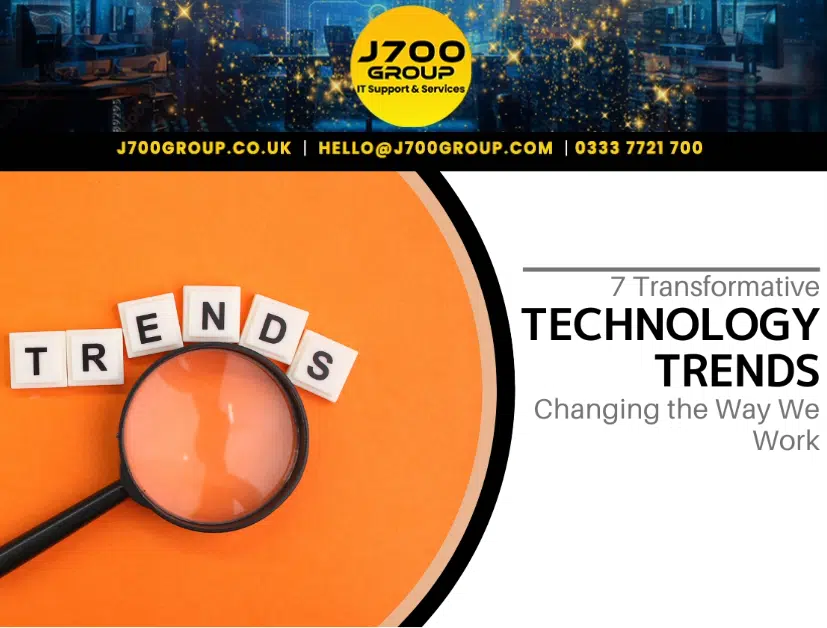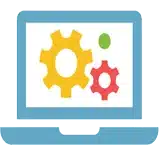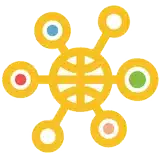7 Technology Trends Changing the Way We Work

Technology is reshaping the world of work at an unprecedented pace. From artificial intelligence to web3, from the metaverse to the hybrid work model. We are witnessing a series of technological revolutions. They are transforming how we communicate, collaborate, create, and innovate.
In this blog post, Jonathan Cundliffe, Managing Director of Lancashire based J700 Group an IT Support and cyber security provider explores some of the most impactful technology trends that are changing the way we work in 2024 and beyond.
1. Artificial Intelligence
AI and Generative AI are not just buzzwords and they are transforming the workplace. These technologies enable automation, allowing teams to handle everyday tasks more efficiently. They free up human resources for more creative and strategic endeavors.
AI is not a new concept, it has however become more powerful and accessible in recent years. This is due to advances in computing power, data availability, and algorithm development.
Artificial intelligence is now augmenting and automating various aspects of work, including data analysis, customer service, image creation, product design, and more.
However, AI also creates significant challenges and risks, including ethical dilemmas, social implications, and workforce displacement. Therefore it is important to adopt responsible and human-centric approaches to the use of AI. As well as ensuring that workers have the skills and support to adapt to the changing nature of work.
2. Remote Collaboration Tools
Advanced collaboration tools have facilitated the rise of remote work. These include video conferencing, project management software, and cloud-based document sharing platforms.
This technology empowers teams to collaborate seamlessly from different corners of the globe. These tools break down geographical barriers, allowing for efficient teamwork and real-time communication.
3. Hybrid Work Model
The hybrid work model is a term that describes the combination of remote and in-office work. This is not a new concept, but it has become more prevalent in the wake of the Covid-19 pandemic.
The hybrid work model offers many benefits, such as:
- Increased productivity
- Reduced costs
- Improved work-life balance
- Enhanced employee satisfaction
- Improved employee retention
The hybrid work model is transforming the way we work. It requires workers to have new skills, tools, and strategies. For example, hybrid work requires workers to have several capabilities to work effectively. These include strong digital literacy, communication, collaboration, and self-management skills.
4. Web3: The Decentralised Internet
Web3 is a term that refers to the next generation of the internet. An internet based on decentralised technologies, such as:
- Blockchain
- Cryptocurrencies
- Smart contracts
- Peer-to-peer networks
Web3 aims to create a more open, transparent, secure, and democratic internet. One where users have more control over their own data, identity, and digital assets.
Web3 also enables new forms of collaboration and value creation. This includes:
- Decentralised autonomous organisations (DAOs)
- Non-fungible tokens (NFTs)
- Decentralised finance (DeFi)
- Social tokens
Web3 is transforming the way we work. It’s creating new business models, platforms, and communities. These are designed to be more inclusive, participatory, and innovative.
Web3 has the potential to generate £38.7 billion in economic value by 2030.
5. Internet of Things (IoT) in the Workplace
IoT devices are creating smart and optimised workplaces. This includes smart thermostats that adjust office temperatures based on occupancy. As well as wearable devices that track employees’ health and productivity. This connectivity enhances efficiency and reduces energy consumption. It also provides valuable data for informed decision-making.
6. Augmented Reality (AR) and Virtual Reality (VR)
AR and VR technologies are revolutionising training, design, and customer interactions. In the workplace, AR and VR offer immersive training experiences. Allowing employees to learn complex tasks in a simulated environment. These technologies are also used in product design. This enables professionals to both visualise and modify prototypes in real time, driving faster innovation cycles.
7. Cybersecurity Advancements<
As digital technologies advance so do cybersecurity threats. Businesses are investing in advanced cybersecurity measures to protect sensitive data. As well as ensuring the privacy of employees and customers.
These innovations include biometric authentication and AI-driven threat detection. Cybersecurity advancements are crucial. They help companies safeguard digital assets and maintain trust in the online workspace.
The Impact of Technology Trends on the Future of Work
These transformative technology trends are not just fleeting novelties. They are shaping the future of work. Businesses that adapt and embrace these technologies gain a competitive edge.
Remote collaboration tools foster flexibility and work-life balance, appealing to the modern workforce. AI and automation enhance efficiency, reducing errors and operational costs.
IoT creates intelligent workspaces, enhancing employee well-being and environmental sustainability. AR and VR drive innovation, offering new ways to engage both employees and customers.
Challenges and Considerations
While these technologies bring immense benefits, they also pose challenges. Workforce training is essential to ensure employees can leverage these tools effectively. Additionally, there are ethical considerations about data privacy and security. As well as the impact of automation on employment. Striking a balance between technological advancement and human welfare is crucial. Especially in this transformative era.
Let J700 Group Guide You Successfully Through Digital Transformation
Navigating new technologies can be complex. There are pitfalls that can waste time and money. Avoid this by working with our team of experts. We can help you customise your transformation to fit your business goals.
For more information, please contact Angelina or Deon on 0333 7721 700 or email [email protected]
J700 Group provide effective IT support and services that enable your business to have secure, responsive and reliable information technology, keeping it running smoothly 24/7. Above this though, we are a family run company who truly care about our customer service and the business relationships we develop.
J700 Group are a Lancashire-based, family-run, professional and responsive, Managed Solutions Provider helping Businesses, to utilise Innovative IT Consultancy Services, Cloud Solutions, Cyber Security, Microsoft 365, Telecoms, Web Design and SEO solutions to propel their organisation to the next level and beyond.
As an experienced IT Support Provider, helping businesses across Lancashire & Manchester, if you need any assistance with your IT including IT Hardware, a Disaster Recovery Policy or Managed Backup Solutions please get in touch with one of our team.
Where to find us: Prinny Mill Business Centre, 68 Blackburn Road, Haslingden, Lancashire, BB4 5HL.
#FutureOfWork #TechTrends #Innovation #TechInnovation #WorkplaceTransformation #DigitalFuture
















